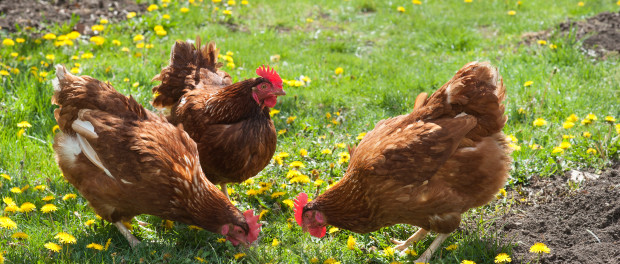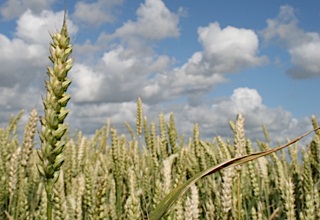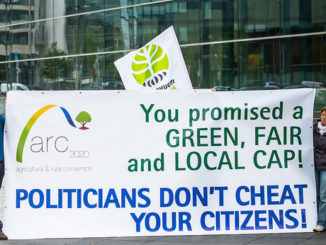The UK’s new Minister with responsibility for farming and food may want to change how farm payments work. Pillar 1 type payments may be dropped and the delicate balance between farming and nature – especially on farms – may change radically. Miles King explains.

This post first appeared on Miles King’s blog
The post-referendum dust is settling following the brutal excision of the Cameron/Osborne cliques from power.
One Department has been knocked down, or split asunder – the Department for Energy and Climate Change. Energy has gone to Business and Industry, Climate Change has gone – where? We await to hear whether it’s merged into DEFRA* (Department of Environment, Food and Rural Affairs) or buried within energy/industry. There’s a clue – Theresa May’s Thinker in Chief and Co-Chief of Staff, Nick Timothy, “dislikes green taxes and high energy costs”.
DEFRA’s future is by no means assured. The new Secretary of State is Andrea Leadsom. Leadsom, you will recall, was bidding to become leader of the Tory Party and the new PM, on Monday 11th. Now she has DEFRA. It feels like a cross between a poisoned chalice and a punishment cell in the workhouse. In the same way that Boris Johnson has been given Foreign Affairs, David Davis has Brexit, Leadsom has been given both the Environmental Sector and the Farmers to deal with/sort out. You can imagine Timothy telling each Brexiteer as they appeared in Number 10 yesterday, on behalf of May (who is too busy to meet them herself)
“You Brex-ed it – now you have to fix it/clean up your own mess. You’ve got 12 months.”
All ARC2020 articles on Brexit
What do we know about Andrea Leadsom, apart from the fact that she thinks people who have children have more of a stake in the future, than everyone else (does that include children themselves?).
This is her speaking in a Guardian Brexit debate in March:
Net we send £9bn a year to the EU, gross it’s £19bn; the remainder we get back in subsidies are things we have to beg for, things we have to co-finance, pet projects of the EU so farmers – yes, they are supplicants asking for roughly 50% back of the money that they paid over in the first place.
On voting to leave the EU, the UK government will absolutely continue in the short term to provide those subsidies whilst we think about what makes sense. And some of the things that would make sense would be environmental trading credits, because at the moment you have farmers who have to do a bit of environmental planning and a bit of farming just to meet the EU requirements.
It would make so much more sense if those with the big fields do the sheep, and those with the hill farms do the butterflies. That would make a lot more sense for the UK and it’s perfectly possible but only if we leave the EU and sort it out for ourselves.
That bears striking resemblance to something farm minister George Eustice said back in 2012. And there should be no surprise that Eustice and Leadsom come from the same place on farm subsidies – as they both worked together on the radical right “Fresh Start” group, formulating what a post-Brexit Britain would look like. Here are some recent proposals from Fresh Start on farm support reform.
Eustice talked of scrapping Pillar One altogether and ploughing (his word) the money into “transferable biodiversity obligations”, meaning farmers in the productive areas would trade subsidy for environmental obligation – ie no pay but no red tape either. No Red Tape at all. Eustice suggested Pillar two funds – for agri-environment schemes and so on, would be disbursed on a much wider range of projects, including regional economic policy.
What else can we glean from Leadsom’s past writing on the subject? Nearly ten years ago she wrote this piece.

Does Britain need its own farming industry?
I went to a fascinating seminar today on the prospects for the British farming industry. Chaired by Ruth Lea of the Centre for Policy Studies, the guest list was impressive, including some of our most influential farmers, a number of peers, and many members of parliament.
What was most fascinating though is that there was not a single representative of the Government.
British farming is in decline, with most notably the pig industry down 40% since Labour came to power, in spite of no change in the amount of pork consumed in Britain. Farming incomes have been dropping since the 1970s, now with huge disparity between the successful and the failing farms. Capital investment in British farming is in decline.
All this is against a backdrop of some big changes taking place:
– the ‘politics’ of food is changing: we are now more conscious than ever of what we eat in terms of quality as well as ‘food miles’;
– health and welfare standards are increasingly higher in Britain, but not necessarily matched elsewhere in the world, even in the EU – therefore the cost of food production in Britain can be comparatively high;
– climate change means water shortages and floods threaten some of those countries who now export to Britain;
– globally, the increasing demand for bio fuels will compete with the use of land for food production.
I think these changes offer a great opportunity for a revival of British farming… in recent years the work of the Soil Association in promoting organic food has been impressive, and I would like to see British farmers emulate that success.
What do I mean by that? Well, how about seize the initiative and start to promote ‘British produce’ aisles in supermarkets?
How about promoting school trips to working farms? I heard recently of a group of 10 year olds who thought you had to kill a cow in order to milk it! Kids talking about British farming is a sure way to influence where the weekly housekeeping money gets spent.
How about farmers launching a campaign on healthy British food? Perhaps promote a ‘Mark’ that all ‘Healthy British Food’ carries on the label. That would surely get round the confusion over ‘country of origin’ labels.
Finally, the government has to help too… Labour seems only to want British farmers to keep the hedgerows tidy, and ensure that there are butterflies and frogs around for their annual nostalgic trips to the countryside.
The fact is, British farming will cease to exist if it is forced to become merely an extended form of landscape gardening.
How government must help is by providing a level playing field. Imported food must meet the same stringent health and animal welfare standards of British food. Subsidies must be abolished. The trade descriptions legislation that enables Country of Origin to be shown as the last country in which food was ‘processed’ must be changed.
As a final point, to go back to my blog of a few days ago… peripheral activities within the sphere of farming, such as hunting, must be protected as a justifiable element of the whole.
At least in the intervening period, Leadsom appears to have taken more of a shine to butterflies. But the sentiment is clear, abolish subsidies, bring back hunting, and no room for frogs. Untidy hedgerows would also be a step forward from where we are now, but yes I’m clutching at straws.
Agri-Industry insiders website Agra-Europe has taken the unusual step of allowing free access to this opinion piece, that is how urgent they feel the situation is. They have looked at the Fresh Start manifesto and found this quote:
“The agricultural sector in New Zealand can keep the cost of production low and compete in a global export market with the lowest level of government support to agriculture in the OECD at only 1% of farm income. This is only possible with light-touch regulation.”
Their analysis of the Fresh Start proposals for farms are thus:
They recommended that “direct payments to farmers in Pillar 1 of the CAP should be phased out, and there should be a parallel reduction in red tape and regulation in order to ensure a globally competitive farming sector.”
In tandem, “Pillar 2 payments for environmental stewardship should be increased with new tradable environmental payments introduced to allow productive land to be more intensively farmed and marginal land to be more focused on environmental stewardship.”
Ideally, all Pillar 1 payments would be phased out over an undetermined timeframe. Under the Fresh Start scenario, this would “encourage innovation and allow our farming sector to compete in a global market where price volatility and increasing costs of production make reform all the more pressing.”
Unspecified “red tape and regulation” are other key areas earmarked for reduction or abolition altogether. 0% of the resulting cost to businesses coming from the EU.
And in line with the wider priorities from the ‘Brexit Boys’ triumvirate of Johnson, Davis and Fox, Fresh Start seeks “an increase in UK trade with countries outside the EU, through bilateral channels. The Government should build on its recent successes in China and Russia unashamedly promoting British food and drink products in emerging markets.”
Andrea Leadsom has laid out her plans for all to see. The question in my mind, is whether her Boss, Theresa May, will let her have her way.
*DEFRA despite not having agriculture or farming in its title, DEFRA is the Department that has Agriculture under its remit.





Pillar I direct payments are actually a case of environmentally damaging subsidy, so dropping these would not harm the environment, rather to the contrary. Some of the other ideas of the the new UK DEFRA minister are indeed scary, especially separating “sheep farming” and “butterfly farming”…